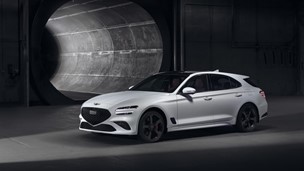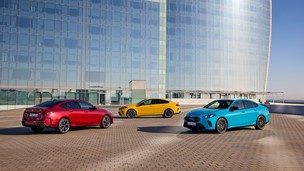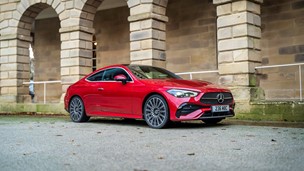The launch of the latest Impreza may have been more important to Subaru, but as far as really enthusiastic drivers are concerned the big news is the introduction of the first turbocharged model.It's not the ultimate version - that's the WRX STI, which will be along later. The plain old WRX reviewed here has a name which doesn't mean what it once did; in the old days, with its hint of a link to the World Rally Championship, it suggested something really special, but more recently it has come to be used for the second-string turbo in the range. If you want a real fire-breather, you're going to have to wait for the STI.The gap between the two is probably greater now than it has ever been in Impreza history. Thrill-seekers are likely to be disappointed, since the WRX is a car of quiet joys. I'll say right now that it is an astonishing piece of work - perhaps my all-time favourite WRX - but even after some hard motoring over brilliant (and happily deserted) roads my feeling at the end of it all was one of admiration rather than excitement.On paper, it seems interesting enough, at least to begin with. At 227bhp and 236lb/ft respectively, the maxmium power and torque figures from the revised 2.5-litre engine are the same as before, though they are both developed further down the rev range. This should mean that the performance is slightly better than before, but in fact it takes nearly a second longer than the outgoing WRX saloon to hit 60mph from rest, and its top speed of 130mph misses the previous mark by 13mph.The only obvious reason for this is that the new hatchback body style is less aerodynamically efficient than the saloon was (airflow over the rear of a hatchback is notoriously treacherous). Even to achieve the performance figures it has, Subaru has had to lower the gearing, which may partly explain why, despite being slower than the old car, the new one uses about the same amount of fuel and has a similar CO2 rating.From behind the wheel there is certainly a sense that the WRX does not accelerate as hard as it should, as if something is holding it back. On the other hand, this could also be because it's so good round corners that the straightline performance is bound to feel disappointing by comparison.The usual Subaru advantage of an unusually low centre of gravity has been increased still further in the new range, since the flat-four engine is mounted nearer the road surface than before. You can hardly go wrong with this, though on very rare occasions in the past Subaru has actually done so by diverting from its usual policy of creating soft but well-damped suspension.This time round the job has been done right, and with a level of daring which borders on recklessness. It's as if the suspension engineers have pushed themselves to the absolute limit in an effort to see just how softly the car can be sprung before turning it into a lump of jelly.They have leant perilously far over the precipice of disaster, but all is well - just when you think that the WRX has been beaten by a bump and is about to wallow helplessly for the next few yards as the dampers struggle to catch up, everything sorts itself out just in time.This softness may strike you as a good or a bad thing, depending on what you want from a turbocharged Impreza. If you like a comfortable ride, this is the WRX you have been waiting for - some of its predecessors have been a bit jittery over uneven surfances, but this one's ability to conceal tarmac imperfections from its occupants is simply unbelievable. It seems as strange to write this as it must do to read it, but I can honestly say that the WRX has a ride quality which makes that of several luxury saloons seem shameful.Inevitably, the soft-edged feel extends to the WRX's behaviour in more testing conditions. The turn-in is positive, but it isn't sharp (in the same way that the throttle response is quite subdued, even though Subaru claims it has worked to improve this).The overall effect is that you have to plan what you're going to do in a corner before you actually do it; there isn't much opportunity to change your mind suddenly, so if you are in the same place mentally as the car is physically you're just not going to get the best out of it.If, however, you are mentally several lengths ahead, as good race and rally drivers always are, the WRX is a marvel. It has so much grip that you feel the chassis could easily cope with a much more powerful engine (though in fact that would require stiffer suspension) and the balance is perfect nearly all the time.During my test there were just two occasions when the front end drifted wide on full throttle, and in each case I could have sorted things out by going back to the same corner and aiming for a slightly different apex.I enjoyed the WRX tremendously, but I don't think it's a safe bet for Subaru as it stands. The handling is phenomenal, and it doesn't hurt the new car's case that it's a few hundred pounds cheaper than the model it replaces. The ride quality defies belief, and the fact that it's exceptionally easy to drive is perhaps - as a female colleague has suggested to me - a sign that more women will buy this car than would have considered any previous WRX.Against all that, I suspect that the new shape may never have the same appeal as that of the saloon. The interior is typically Impreza-dull (though the Legacy and the B9 Tribeca show that Subaru can do excellent interiors when it tries). And the performance/economy compromise is very disappointing.Perhaps most important are the quiet joys I referred to earlier. The WRX is an enormously capable car, at least as far as the handling is concerned, but its capability is expressed in very subtle ways. Whether or not it is too subtle for long-time fans of turbocharged Imprezas is a question Subaru may find itself having to consider in the near future. Engine 2457cc, 4 cylinders Power 230bhp Transmission 5-speed manual Fuel/CO2 27.2mpg / 246g/km Acceleration 0-62mph: 6.5 seconds Top speed 130mph Details correct at publication date

Our Rating



